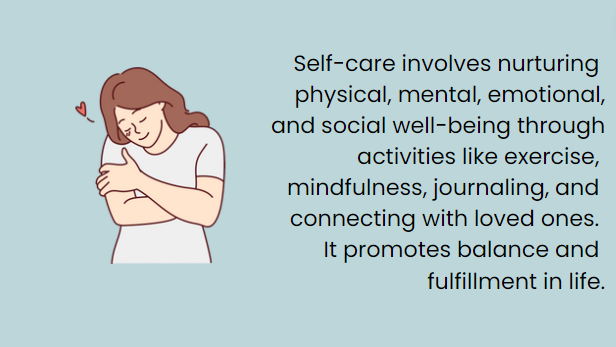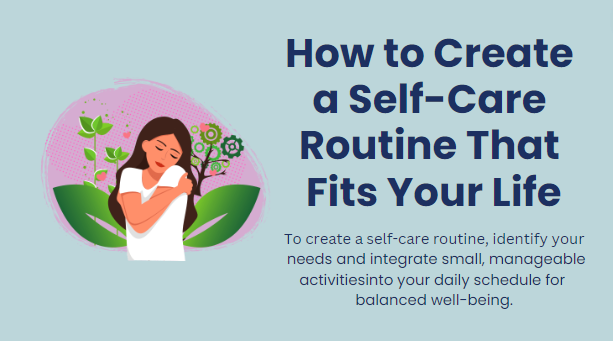In today’s fast-paced world, taking care of yourself is more important than ever. A well-designed self-care routine can help you manage stress, improve your overall well-being, and boost your productivity. This article will guide you through creating a personalized self-care routine that seamlessly integrates into your daily life.
Understanding Self-Care
Self-care is any activity that you deliberately engage in to take care of your physical, mental, and emotional health. It’s not selfish or indulgent; it’s essential for maintaining a balanced and fulfilling life.
Types of Self-Care
- Physical self-care
- Emotional self-care
- Mental self-care
- Social self-care
- Spiritual self-care
- Professional self-care
Each type of self-care contributes to your overall well-being in unique ways. For example, physical self-care supports your body’s health, while emotional self-care helps you process and manage your feelings effectively.
See also>> Understanding Anxiety: Tips to Feel Better
Assessing Your Current Lifestyle
Before creating your self-care routine, take a moment to evaluate your current lifestyle. Consider your daily schedule, commitments, and personal needs.
| Time of Day | Current Activities | Potential Self-Care Opportunities |
| Morning | Rush to work | 10-minute meditation or stretching |
| Afternoon | Busy work schedule | Short walk during lunch break |
| Evening | Family time | Reading before bed |
Creating Your Personalized Self-Care Routine
1. Start Small
Begin with small, manageable self-care activities that you can easily incorporate into your daily life. This approach helps build sustainable habits without overwhelming you.
Tip: Try the “two-minute rule” – if a self-care activity takes less than two minutes to complete, do it immediately. This could be drinking a glass of water or doing a quick stretch.
2. Identify Your Needs
Reflect on what areas of your life need the most attention. Are you struggling with stress, lack of sleep, or poor nutrition? Prioritize self-care activities that address these specific needs.
Exercise: Create a “wellness wheel” by drawing a circle and dividing it into sections representing different areas of your life (e.g., physical health, relationships, career). Rate your satisfaction in each area from 1-10 to visually identify where you need to focus your self-care efforts.
3. Set Realistic Goals
Establish achievable goals for your self-care routine. Remember, consistency is key, so focus on what you can maintain long-term rather than setting overly ambitious targets.
SMART Goal Example: “I will practice mindfulness meditation for 10 minutes every morning before work for the next month.”
4. Schedule Self-Care Time
Treat self-care as you would any other important appointment. Block out time in your calendar specifically for self-care activities.
5. Be Flexible
Life can be unpredictable, so be prepared to adjust your routine as needed. Having a flexible approach ensures that you can maintain your self-care practices even when unexpected events occur.
See also>> Why Taking Breaks Can Improve Your Mental Health
Self-Care Activities for Different Aspects of Life
Physical Self-Care
- Regular exercise (aim for at least 150 minutes of moderate-intensity activity per week)
- Healthy eating habits (focus on a balanced diet rich in fruits, vegetables, whole grains, and lean proteins)
- Adequate sleep (7-9 hours per night for most adults)
- Regular health check-ups (annual physical exams and necessary screenings)
- Proper hydration (aim for 8 glasses of water per day)

Emotional Self-Care
- Journaling (try the “three good things” exercise – write down three positive experiences each day)
- Practicing gratitude (keep a gratitude journal or share your appreciation with others)
- Engaging in hobbies (dedicate time to activities you enjoy purely for pleasure)
- Seeking therapy or counseling when needed
- Emotional regulation techniques (like deep breathing or progressive muscle relaxation)
Mental Self-Care
- Reading (aim for a mix of fiction and non-fiction to stimulate different parts of your brain)
- Learning new skills (take online courses or attend workshops)
- Puzzles or brain games (sudoku, crosswords, or digital brain-training apps)
- Mindfulness practices (try apps like Headspace or Calm for guided sessions)
- Digital detoxes (set boundaries for technology use to give your mind a break)
Social Self-Care
- Spending quality time with loved ones (schedule regular catch-ups or family activities)
- Joining clubs or groups with shared interests (book clubs, sports teams, or hobby groups)
- Volunteering (giving back to the community can boost your sense of purpose and connection)
- Networking events (professional or social gatherings to expand your circle)
- Setting healthy boundaries (learn to say “no” to protect your time and energy)
Spiritual Self-Care
- Meditation (start with guided meditations if you’re new to the practice)
- Yoga (combines physical activity with mindfulness)
- Nature walks (spend time in green spaces to reduce stress and increase well-being)
- Practicing religious or spiritual beliefs (attend services or engage in personal rituals)
- Reflection and introspection (journal about your values and life purpose)
Professional Self-Care
- Setting work-life boundaries (establish clear start and end times for work)
- Continuous learning (attend workshops or conferences in your field)
- Networking and mentorship (build supportive professional relationships)
- Workspace optimization (create a comfortable and inspiring work environment)
- Regular breaks (use techniques like the Pomodoro method to incorporate short breaks throughout the workday)
Incorporating Self-Care into Your Daily Routine
Here’s an example of how you can integrate self-care activities into your daily schedule:
| Time | Activity | Self-Care Benefit |
| 6:30 AM | 10-minute meditation | Mental and emotional well-being |
| 12:00 PM | Lunch break walk | Physical activity and stress relief |
| 3:00 PM | 5-minute desk stretching | Physical comfort and mental break |
| 7:00 PM | Hobby or family time | Emotional and social well-being |
| 9:30 PM | Reading before bed | Mental relaxation and better sleep |
Leveraging Technology for Self-Care
In our digital age, technology can be both a hindrance and a help to self-care. Here’s how to use it to your advantage:
- Self-Care Apps: Use apps like Calm, Headspace, or Jour for guided meditation, sleep stories, and mood tracking.
- Fitness Trackers: Devices like Fitbit or Apple Watch can help you monitor physical activity, sleep patterns, and heart rate.
- Online Communities: Join supportive online groups focused on self-care and wellness for inspiration and accountability.
- Digital Reminders: Set reminders on your phone for self-care activities, water intake, or movement breaks.
- Virtual Therapy: Platforms like BetterHelp or Talkspace offer convenient access to mental health professionals.

Remember to balance technology use with screen-free time to avoid digital overwhelm.
Overcoming Common Obstacles
- Lack of Time: Start with short 5-10 minute self-care activities and gradually increase as you become more comfortable.
- Guilt: Remember that taking care of yourself enables you to better care for others and perform at your best.
- Lack of Motivation: Find an accountability partner or join a support group to stay motivated.
- Financial Constraints: Many self-care activities, such as walking, meditation, or journaling, are free or low-cost.
- Inconsistency: Use habit-tracking apps or a journal to monitor your progress and stay consistent.
- Perfectionism: Embrace imperfection in your self-care journey. Some self-care is better than no self-care.
Measuring the Impact of Your Self-Care Routine
Keep track of how your self-care routine affects your overall well-being. Notice improvements in your mood, energy levels, productivity, and relationships. Adjust your routine as needed based on these observations.
Self-Care Journal Prompts:
- How did I feel before and after my self-care activity today?
- What self-care activities brought me the most joy or relief this week?
- Are there any areas of my life that still feel neglected?
- How has my stress level changed since implementing my self-care routine?
See also>> 7 Simple Ways to Boost Your Mood Every Day
FAQs
Q: How often should I practice self-care?
A: Ideally, incorporate some form of self-care into your daily routine. Even small acts of self-care can have a significant impact when done consistently.
Q: Can self-care be expensive?
A: Not necessarily. Many effective self-care activities, such as meditation, walking, or journaling, are free or low-cost. Focus on activities that align with your values and budget.
Q: How do I know if my self-care routine is working?
A: Pay attention to improvements in your mood, energy levels, stress management, and overall well-being. If you notice positive changes, your routine is likely effective. Consider keeping a journal to track your progress over time.
Q: Is it selfish to prioritize self-care?
A: Not at all. Self-care is essential for maintaining your physical and mental health, which in turn allows you to be more present and supportive for others in your life. It’s like putting on your own oxygen mask first in an airplane emergency.
Q: Can self-care replace professional medical or mental health treatment?
A: While self-care is beneficial for overall well-being, it should not replace professional medical or mental health treatment when needed. Always consult with healthcare professionals for specific health concerns.
Q: How can I maintain my self-care routine while traveling or during busy periods?
A: Plan ahead and adapt your routine to fit your circumstances. Pack portable self-care items (like a journal or meditation app), and focus on simple activities that don’t require much time or equipment.
Q: What if I don’t enjoy typical self-care activities like meditation or bubble baths?
A: Self-care is personal. Explore different activities until you find what resonates with you. Your self-care routine should be enjoyable and aligned with your interests and values.
Q: How can I encourage my family or friends to practice self-care?
A: Lead by example and share your positive experiences. Invite them to join you in self-care activities, but remember that everyone’s journey is unique. Offer support without being pushy.
Conclusion
Creating a self-care routine that fits your life is a journey of self-discovery and personal growth. By starting small, identifying your needs, and being consistent, you can develop a sustainable self-care practice that enhances your overall well-being. Remember, self-care is not a luxury; it’s a necessity for living a balanced, fulfilling life. Embrace the process, be patient with yourself, and enjoy the positive changes that come with prioritizing your well-being.
